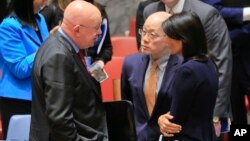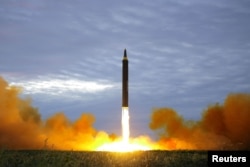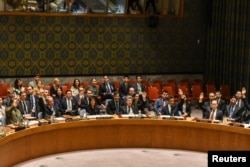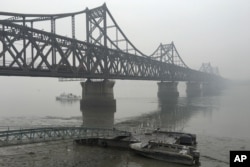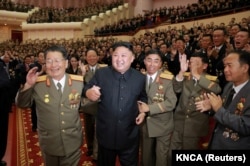While debate continues in Washington about how the latest round of sanctions against North Korea could have been tougher, and U.S. President Donald Trump’s administration ponders additional actions, patience is wearing thin in China with the country’s longtime ally and communist neighbor.
On the streets and in academic circles, some are beginning to see the North Korea problem not just as a threat to South Korea, Japan and the United States, but to China as well.
Not a good neighbor
“It’s dangerous. This is all happening right next door,” says one woman surnamed Song, a foreign trader who lives in Beijing. “North Korea has been researching and developing nuclear weapons for a long time and almost all of the international community is opposed to that effort, and yet it continues to go its own way.”
Song says that while China has done a lot to “selflessly” help North Korea, Pyongyang has done little to repay Beijing. In fact, it has done just the opposite, she adds.
“It is a country that clearly has no bottom line,” she says.
Earlier this week, China and Russia, along with other members of the United Nations Security Council, approved a fresh round of sanctions on North Korea that included caps on oil and natural gas imports and a ban on textile exports. The U.S.-drafted resolution included new measures that will prohibit North Koreans from working overseas.
The United States wanted an all-out embargo on oil exports, but China and Russia refused to go along with that proposal.
Lu Chao, a North Korea expert at the Liaoning Academy of Social Sciences in northeast China, says an all-out ban on oil exports to the North would collapse its economy; but, the compromise the two sides reached is still significant, he adds.
“Cutting energy exports [to the North] by 30 percent will hit North Korea’s economy and society hard. That will push Pyongyang to ponder… whether it should suspend its nuclear missile tests in order to re-engage with the international society,” Lu says.
China’s basic position on North Korea has long been one of “no war, no nukes and no instability;” but, with North Korea’s repeated missile and ICBM launches, as well as its latest nuclear test, Beijing increasingly is finding itself with less and less room to maneuver.
Analysts estimate that if exports to the North were completely cut off, it would only have enough reserves to last about 12 months or less. China is the North’s biggest supplier of oil, which is delivered by rail, air and an underground pipeline.
Of all the routes, the pipeline is the biggest source of crude oil. And that oil, Lu says, comes from China's Daqing Oil Field.
The oil contains a higher level of wax, which could clog or damage the pipeline if it is shut down. The cut of oil supplies by 30 percent, however, will not be an issue for the pipeline, he says.
That is, if North Korea, does not take any further action.
If it does, sanctions could be tightened even further and a growing chorus of scholars here is advocating that Beijing take a tougher stance.
“Without a doubt, China’s relations with the North Korea have hit rock bottom [and] are at a historic low,” Lu says. “The only roadblock to their relationship is Pyongyang’s insistence in nuclear development – a red line that China will never, ever tolerate.”
The United States has indicated it could add further sanctions, if the current U.N. resolution is not fully implemented. In an interview Wednesday with Fox News, Treasury Secretary Steven Mnuchin warned that the U.S. was prepared to stop trade with any country that did not follow through with the new measures.
Tougher approach
Among the public in China, some see a need for a tougher approach, even though there is skepticism about the effectiveness of sanctions or whether North Korean leaders Kim Jong Un means what he says.
“[I support sanctions] if they don’t impact the people of North Korea that much. [Sanctions] on the leadership should be tougher,” says one man with the last name of Yang, who is a retired engineer.
Some see Kim’s rhetoric as nothing but talk, but also see little room for China to sit by idly.
“I don’t think he’ll necessarily do what he says. Start a nuclear war or something. It’s all political posturing,” says another man, surnamed Yang, who works in the financial industry.
He says that as a neighbor, Beijing has little choice but to speak up and let North Korea know China disagrees with what it is doing.
“The best thing would be for everyone to sit down and talk. And I think China should play a mediating role” adds one woman, surnamed Wang, who is a doctor and resident in Beijing.
The Chinese government has long advocated a return to talks on denuclearization, but those have been stalled for nearly a decade and North Korea has shown no sign it is interested in giving up its weapons.




